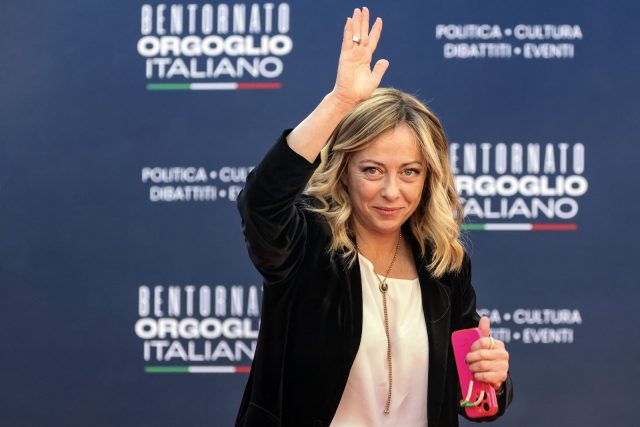
The Conservative Political Action Conference (CPAC) once again confirms itself as the premier event for the conservative movement in the United States. Founded in 1974, the convention gathers political figures, intellectuals, and activists to discuss right-wing policies, with a strong emphasis on traditional values and economic nationalism. In recent years, CPAC has become a privileged platform for the Trump wing of the Republican Party, which fights progressive ideologies and the so-called “cancel culture.”
This year, among the notable international guests, Giorgia Meloni, Italy’s Prime Minister and leader of Fratelli d’Italia, stood out as she participated via video link. Her presence solidified the connection between Italian and European conservatism and its American counterpart.
Meloni’s Speech: Identity and Pragmatism
Meloni opened her address by reaffirming her firm defense of conservative values, touching on themes dear to the American audience: family, the fight against cancel culture, opposition to radical environmental policies, and the pervasiveness of socialism. The Prime Minister emphasized that “freedom must be defended by all means,” echoing some of the themes addressed by U.S. Vice President J.D. Vance at the Munich conference.
One of the most anticipated segments of her speech was about the war in Ukraine. Meloni reaffirmed Italy’s support for Kyiv, speaking of a “just and lasting peace,” while avoiding direct confrontation with Donald Trump, who in recent days has taken a more ambiguous stance on the issue. In a statement that drew much commentary, she said, “Peace in Ukraine can only be built with the contribution of all, but I know that with Trump, we will never again see the disaster that happened in Afghanistan four years ago.”
On the transatlantic relations front, Meloni sent a clear message: “Our adversaries hope that Trump will distance himself from us Europeans. I know him—he is strong and effective. I bet we will prove them wrong.” She also acknowledged the need for Europe to increase military spending, a topic close to the Trump administration’s heart.
The Issue of Tariffs and the Future of Trade Relations
Another sensitive issue addressed by Meloni was tariffs and the risk of a trade conflict between Europe and the United States. “We don’t need to explain how interconnected our economies are and how the unpredictable outcomes of a trade war would only benefit other major powers,” the Prime Minister warned, in an evident reference to China.
Meloni’s speech strengthened her image as a global conservative leader, also capturing the attention of American political observers. Her closeness to the Trump-aligned wing of the Republican Party was balanced by a pragmatic approach aimed at avoiding fractures with European allies.
Fidanza: “Friendship Is Not Submission”
Carlo Fidanza, head of the Fratelli d’Italia delegation to the European Parliament and vice president of the European Conservatives, commented on the Prime Minister’s participation: “Giorgia Meloni has shown that friendship is not submission. She has called for the resurgence of the West and unity between Europe and America. On Ukraine and tariffs, she demonstrated that we are not mere executors, but partners with an autonomous vision.”
Fidanza also defended Meloni from criticism by the left: “The opposition hoped that, to honor Trump, she would abandon support for Ukraine, but they were wrong. Some in the European mainstream attack Trump simply because he is a ‘right-wing American,’ without understanding that the real challenge is maintaining a solid bridge between the two sides of the Atlantic.”
Reactions and Controversies in Italy
In Italy, Meloni’s participation in CPAC sparked mixed reactions. The opposition, from Elly Schlein to Giuseppe Conte, criticized the Prime Minister’s presence at the conservative convention, accusing her of being “a vassal of the United States.” Nicola Fratoianni even called for her speech to be canceled, while Angelo Bonelli described it as “right-wing propaganda.”
Carlo Calenda took a more nuanced stance, recognizing Meloni’s consistency in supporting Ukraine while maintaining reservations about her excessive closeness to Trump’s Republicans. “Meloni’s words on Ukraine were clear and decisive in a very difficult context. She deserves credit for that,” said the leader of Azione.
On the other hand, the center-right defended the Prime Minister’s decision. Tommaso Foti, Minister for European Affairs, reiterated: “An alliance with the U.S. does not mean submission; foreign policy requires pragmatism.”
CPAC remains a strategic event for international conservative politics, and Giorgia Meloni seized the opportunity to strengthen her role as a global leader. Her speech balanced ideological identity with diplomatic pragmatism, sending a clear message: Italy seeks to remain a bridge between Europe and the United States without being subordinate to anyone. With the European elections approaching, Meloni’s intervention could have repercussions not only on transatlantic relations but also on internal political balances within the EU.



 Subscribe
Subscribe